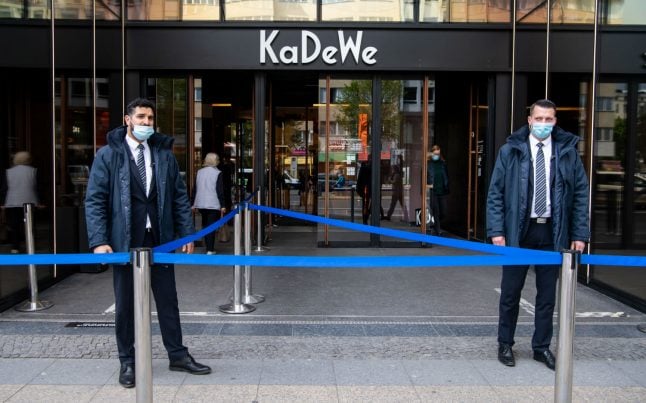Further easing of the lockdown was decided at a meeting of the Berlin Senate on Tuesday May 5th in view of falling coronavirus infection figures.
There have been more than 6,000 Covid-19 cases in Berlin since the start of the pandemic with about 150 deaths. Around 5,200 people have reportedly recovered.
Currently only shops with a retail size under 800 square metres are permitted to open in Germany, along with certain other stores such as car dealerships and bookstores.
However, Berlin mayor Michael Müller said this restriction would be scrapped.
Without giving away the exact timetable, Müller said he wanted restaurants to reopen soon.
It may not be from Monday May 11th, but “it is becoming apparent that something could happen there very quickly during or at the end of next week,” said Müller.
He said there would be several phases and Berlin would work with neighbouring state Brandenburg on the plan.
The German capital has also proposed to reopen sports facilities in the coming weeks.
However, all venues and restaurants that open must have strict hygiene and distancing concepts in place.
After the meeting with Merkel and state premiers on Wednesday, concrete plans will be drawn up.
Müller said despite the restart of public life, things will not return to what they were like before the coronavirus pandemic.
READ ALSO: Bavaria to reopen restaurants from May 18th as coronavirus cases drop
“It does not mean that there is no longer any danger,” he said. “It is only the last few weeks of initial restrictions that have enabled us to ease the situation a little.” Berliners will have to continue to live with rules and restrictions for a long time, he added.
Regarding the relaxing of measures in other federal states, Müller was critical: “I am concerned about what is developing nationwide.” In the past months, he said, state premiers have “remained close in the corona crisis”.
The low infection figures nationwide are a result of this “joint, clever, level-headed approach,” he said.
READ ALSO:
- How Germany's states are pushing to relax coronavirus lockdown measures
- Merkel warns Germans to 'remain disciplined' despite easing coronavirus measures
What could dining look like in Berlin?
When it comes to restaurants, suggested hygiene rules will likely include 1.5 meters distance between tables, staff wearing masks, disinfecting tables between guests, and guest limits for each restaurant (e.g. 10 square meters per person).
“We are ready for the opening in Berlin with a phased plan that we have worked out together with the industry. The top priority remains health protection,” Ramona Pop, senator for economic affairs, told local newspaper B.Z.
It is likely that outdoor dining will be allowed first.
 An empty cafe in Berlin. Photo: DPA
An empty cafe in Berlin. Photo: DPA
Stays at restaurants could also be limited to two hours while salt and pepper shakers may not be allowed on the table.
Meanwhile, digital menus will be encouraged as well as cleaning cloths for guests.
READ ALSO: 'We have to think in phases': Is this how Germany can return to life with coronavirus?



 Please whitelist us to continue reading.
Please whitelist us to continue reading.
Member comments